|
|
|
Sort Order |
|
|
|
Items / Page
|
|
|
|
|
|
|
| Srl | Item |
| 1 |
ID:
178712
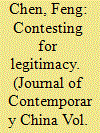

|
|
|
|
|
| Summary/Abstract |
‘Worker Representation’ (WR) originated as a spontaneous practice backed by workers’ collective actions in response to the failed role of trade unions. It allows workers to bargain with employers in a somewhat organized manner, thus facilitating the possibility of voluntary negotiations for dispute settlement. WR activists have sought to regularize the practice and establish its legitimacy in pragmatic, normative and cognitive terms. Yet WR poses a dilemma to the government, as it brings two divergent outcomes: it provides solutions to labor disputes and it inspires labor activism. As a result of its dual institutional logic of dispute resolution and stability maintenance, the government’s response to WR has oscillated between accommodation and suppression.
|
|
|
|
|
|
|
|
|
|
|
|
|
|
|
|
| 2 |
ID:
131958
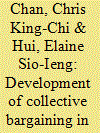

|
|
|
|
|
| Publication |
2014.
|
| Summary/Abstract |
2010 was a turbulent year for labour relations in China. The wave of strikes sparked by the Honda workers has highlighted the urgent need for trade union reform and workplace collective bargaining. In response to this turbulence, the Chinese government has stepped up efforts to promote the practice of collective bargaining, which had been neglected under the existing "individual rights-based" labour regulatory framework. In the midst of rapid social and policy changes, this article aims to examine the effect of labour strikes on the development of collective bargaining in China. The authors argue that, driven by growing labour protests, the collective negotiation process in China is undergoing a transition, from "collective consultation as a formality," through a stage of "collective bargaining by riot," and towards "party state-led collective bargaining." This transition, however, is unlikely to reach the stage of "worker-led collective bargaining" in the near future.
|
|
|
|
|
|
|
|
|
|
|
|
|
|
|
|
| 3 |
ID:
148276
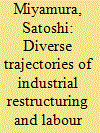

|
|
|
|
|
| Summary/Abstract |
It is often claimed that industrial restructuring leads to diminished roles for trade unionism and other forms of labour organisations by informalising employment and relocating production. Drawing on selected case studies from long-term fieldwork in regions of India, this article shows that trajectories of industrial restructuring and the responses by organised labour over the past two decades have been diverse. It is argued that the diverse response not only reflects structural opportunities and constraints for labour to be organised in particular ways, but also different histories and experiences of labour association. Contrary to the presumption about the general demise of trade unionism and the apparent unattainability of class solidarity in contemporary globalised capitalism, it is observed that India’s labour movement is experiencing a degree of resurgence, and new forms of labour organisations and activism are emerging, especially involving informal workers in the formal sector. That these innovative forms of mobilisation are shaped by experiences and aspirations that do not conform to the established institutionalised frameworks for dispute resolution has important policy and political implications.
|
|
|
|
|
|
|
|
|
|
|
|
|
|
|
|
| 4 |
ID:
133646
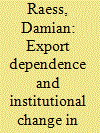

|
|
|
|
|
| Publication |
2014.
|
| Summary/Abstract |
This article explores the adjustment of wage bargaining institutions to international trade in Germany. Embracing IPE as opposed to CPE lenses yields a novel interpretation of change in the institution of wage bargaining. Export dependence of a sector, we argue, has destabilizing effects for industry-wide bargaining by sparking an intra-sectoral cleavage between domestic- and export-oriented enterprises. Specifically, the greater the degree of export dependence of a sector, the greater the degree to which domestic-oriented enterprises within that sector will abandon collective bargaining. We also explain how workplace employee representation through works councils mitigates this effect, such that the presence of works councils helps domestically oriented firms to hold to collective bargaining agreements in the face of a sector's deepening exposure to export markets. These claims find empirical support in the history of labor relations developments in the metal industry and, especially, in extensive analysis of a cross-section of establishments. Our findings attribute major responsibility to the firms driving globalization for undermining collective bargaining institutions and suggest that economic globalization is a cause of dualization. In all, the article provides fresh ammunition for a version of globalization-induced institutional convergence. [Correction added after online publication on May 28, 2014: "conversion" changed to "convergence" in preceding sentence.]
|
|
|
|
|
|
|
|
|
|
|
|
|
|
|
|
| 5 |
ID:
092869
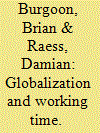

|
|
|
|
|
| Publication |
2009.
|
| Summary/Abstract |
This article challenges popular wisdom that economic globalization uniformly increases working time in industrialized countries. International investment and trade, they argue, have uneven effects for workplace bargaining over standard hours and over work-time flexibility, such as use of temporary or fixed work contracts. The authors explain how such globalization will tend to more substantially decrease standard hours than it does work-time flexibility. And they explain how works councils and union-led collective bargaining alter the way globalization affects both aspects of working time.The analysis of German enterprise data supports these expectations. Measures of globalization diminish standard working hours but yield more temporary work, fixed-contract work, and flexible working arrangements. Works councils and collective bargaining, however, mediate these effects in contrasting ways. Among enterprises without works councils or collective agreements globalization triggers more standard hours, but among firms with such representation globalization triggers fewer hours. With respect to flexibility, however, globalization increases use of temporary or fixed-term contracts more strongly where works councils or collective bargaining are present than when they are not. In short, economic openness has uneven consequences for working time, and firm-level labor representation channels those consequences in ways that highlight political agency in how people respond to globalization.
|
|
|
|
|
|
|
|
|
|
|
|
|
|
|
|
| 6 |
ID:
184632


|
|
|
| 7 |
ID:
169210


|
|
|
|
|
| Summary/Abstract |
Since their appearance in the mid-1990s, Chinese labour NGOs have mostly focused on disseminating labour law and guiding labour disputes through official channels. In so doing, they have assisted the Chinese Communist Party in achieving its paramount goal of maintaining social stability. In line with this approach, activists in these organizations have traditionally framed their work in terms of “public interest” or “legality,” both of which resonate with the hegemonic discourses of the Party-state. However, earlier this decade a minority of Chinese labour activists began to employ some new counterhegemonic narratives centred on the experience of the labour movement and the practice of collective bargaining that attempted to recode the proletarian experience outside of its official representation. In this paper we analyze this discursive shift through the voices of the activists involved, and argue that the rise of these new counterhegemonic voices was one of the reasons that led to the Party-state cracking down on labour NGOs.
|
|
|
|
|
|
|
|
|
|
|
|
|
|
|
|
| 8 |
ID:
043266


|
|
|
|
|
| Publication |
London, Routledge & Kegan Paul, 1972.
|
| Description |
xiii,276p.
|
| Standard Number |
0710073062
|
|
|
|
|
|
|
|
|
|
|
|
Copies: C:1/I:0,R:0,Q:0
Circulation
| Accession# | Call# | Current Location | Status | Policy | Location |
| 010947 | 339.5/BAL 010947 | Main | On Shelf | General | |
|
|
|
|
| 9 |
ID:
048258


|
|
|
|
|
| Publication |
Stamford, JAI Press, 1998.
|
| Description |
xvi,
|
| Series |
International review of comparative public policy. v. 10
|
| Contents |
Contents: p.1 Labor markets in industrialized countries. p. 2 Labor markets in transitional and industrializing economies
|
| Standard Number |
0762303751
|
|
|
|
|
|
|
|
|
|
|
|
Copies: C:1/I:0,R:0,Q:0
Circulation
| Accession# | Call# | Current Location | Status | Policy | Location |
| 042652 | 320.607/DON 042652 | Main | Withdrawn | General | |
|
|
|
|
| 10 |
ID:
166100
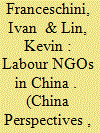

|
|
|
|
|
| Summary/Abstract |
Since their appearance in the mid-1990s, Chinese labour NGOs have mostly focused on three kinds of activities: establishing workers’ centres; carrying out outreach programs on labour rights; and conducting social surveys and policy advocacy. Some scholars have strongly criticised this approach, considering it excessively unbalanced towards an individualistic and narrowly legalistic view of labour rights and thus in line with the political agenda of the Party-state. Still, in the past few years, as labour conflict intensified, a handful of labour NGOs have moved forward to adopt a more militant strategy focussed on collective bargaining and direct intervention into worker collective struggles. Based on dozens of interviews with labour activists and workers and detailed analysis of two case studies of NGO-fostered collective labour mobilisation in Southern China in 2014-2015, this paper will outline the personal and political reasons that motivated these organisations to move beyond a narrow legalistic approach and turn towards collective struggles. It will also describe the strategies that Chinese labour activists have adopted in dealing with collective cases. We will conclude by examining the main challenges that labour activists in China have to face when dealing with labour unrest and by questioning the sustainability and feasibility of this new approach in the current political climate.
|
|
|
|
|
|
|
|
|
|
|
|
|
|
|
|
| 11 |
ID:
173855
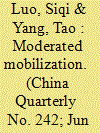

|
|
|
|
|
| Summary/Abstract |
In response to a series of strikes in south China in 2010, a new model of collective bargaining has emerged, featuring what this article describes as “moderated mobilization.” Distinct from what is typically known as China's quadripartite industrial relations system, whereby workers are separated from the party-state, official trade unions and employers, this model shows workers and enterprise-level trade unions in collaboration with one another. According to our observations from 2012 to 2017, some enterprise unions have successfully mobilized workers throughout the collective bargaining process. These unions are democratically elected by workers and are relatively independent from the official authorities. At the same time, they have “moderated” such mobilization particularly to reduce labour militancy, given the political and institutional constraints within which they must work. The implication of this new model is significant. Although it might be far from solving the quadripartite dilemma, it has signalled an increase in local initiatives among enterprise unions – a previously neglected but pragmatically favourable channel for workers.
|
|
|
|
|
|
|
|
|
|
|
|
|
|
|
|
| 12 |
ID:
153636
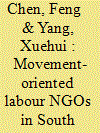

|
|
|
|
|
| Summary/Abstract |
Movement-oriented labour NGOs in China are groups committed to the advancement of workers’ collective interests in a way very similar to that of trade unions in other countries. As the gap between workers’ demands for collective bargaining and their lack of union representation widens, the role of movement-oriented labour NGOs has increased. These NGOs are led and driven by former workers who have a strong consciousness of workers’ rights and who fought in the workplace for their fellow workers’ interests as well as their own. The leadership shown by former workers significantly accounts for the behavioural patterns and strategic choices of movement-oriented labour NGOs. The study reported in this article uses two descriptive concepts to characterize the emergence and role of movement-oriented labour NGOs: exit with voice and displaced unionism. The former refers to the social process by which former workers become activists of movement-oriented labour NGOs, while the latter points to a grass-roots labour movement facilitated from outside the factory gates. This article argues that, while having performed a trade union-like role and promoted worker-led collective bargaining, movement-oriented labour NGOs embody a fundamental predicament of the Chinese labour movement, which is that organized labour activism in the Chinese workplace is largely prohibited.
|
|
|
|
|
|
|
|
|
|
|
|
|
|
|
|
| 13 |
ID:
158261
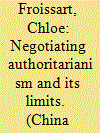

|
|
|
|
|
| Summary/Abstract |
Contrary to some scholars’ assertions, worker-led collective bargaining has become a practical reality in China, especially as seen in Guangdong Province between 2011 and 2015. This article analyses the practices and strategies of negotiation to show how this is possible in a regime that recognizes neither independent trade unions nor the right to strike. Labour NGOs have become a catalyst for collective action that enables workers to change the power balance with employers, official unions and local authorities and alter their response to labour conflicts. This article thus challenges the concept of ‘bargained authoritarianism’ by stressing social actors’ ability to carve out a space for negotiating authoritarianism despite obvious limits and tightening political constraints. However, collective bargaining will remain ad hoc and localized as long as trade unions and local authorities refuse to strike a durable alliance with workers and labour NGOs.
|
|
|
|
|
|
|
|
|
|
|
|
|
|
|
|
| 14 |
ID:
108799
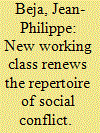

|
|
|
| 15 |
ID:
168018


|
|
|
|
|
| Summary/Abstract |
This article analyses the way in which, since 2010, Chinese trade unions have been trying to find forms of authoritarian collective bargaining that allow them to advance workers’ interests without calling into question their belonging to the state apparatus. It compares the case of the Dalian Industrial Zone to that of the Shenzhen Pilot Zone in a bid to understand how the unions try to acquire effectiveness and legitimacy in the absence of any progress in terms of representation.
|
|
|
|
|
|
|
|
|
|
|
|
|
|
|
|
| 16 |
ID:
170269
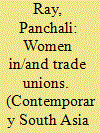

|
|
|
|
|
| Summary/Abstract |
This essay draws from an ethnographic study on nurses and attendants in the city of Kolkata to re-turn to the question of women’s consciousness and agency. I trace women’s reluctance to participate in union activities both to the failure of formal mechanisms of collective bargaining in representing workers’ interests, and to gendered norms that come in the way of organizing women workers. I explore how the performance of respectable femininity, legitimized by class and caste norms, inhibits women’s participation in intensely politicized masculine domains. Though at first glance it may seem that women’s reluctance to participate in union activities is gender neutral, I demonstrate that gender norms produce a social field that denies women political agency.
|
|
|
|
|
|
|
|
|
|
|
|
|
|
|
|
|
|
|
|
|